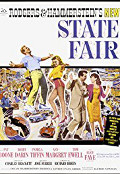
Directed by
Jose Ferrer
118 minutes
Rated PG
Reviewed by
Bernard Hemingway

State Fair (1962)
Watching this film one is likely to ask why anyone bothered to re-make Walter Lang's 1945 Rodgers and Hammerstein musical, itself a re-make of a Will Rogers vehicle adapted from a source novel of the same name by Philip Stong. Admittedly both film versions were box office successes but overall, there are many more losses in this re-boot than gains.
On the downside in relocating the story from Iowa to Texas a good deal of the Lang version’s hokey appeal has been lost (as well as one of the songs, ‘All I Owe Ioway’ which has been replaced by a similar novelty number ‘It's The Little Things in Texas’). Although Ma (Alice Faye) and Pa (Tom Ewell) are once again in competition, she with her mincemeat and he with his beloved hog, Blue Boy, director José Ferrer, in the last of a clutch of films he directed, does not imbue the scenes with anything like comparable humour or charm. Perhaps the seventeen year interval between the films which straddled the growing gap between country and city was simply too much with the film looking much more like one of Elvis Presley's contemporary vehicles, especially thanks to the presence of Ann-Margret and Wayne's re-invention as a rev-head, Viva Las Vegas (1964).
Richard Rodgers contributes five new songs (Hammerstein has passed by then) but none of them are particularly distinguished. Probably most damagingly the news-hound role has been re-written presumably with the intention of making him more of a hip operator but the result is that, at least in Bobby Darin’s rather maladroit hands, he comes across as a loud-mouthed creep, making a relationship difficult to understand in the Lang version completely incomprehensible here. Unfortunately Pamela Tiffin, a former model in her big screen debut is a bland presence as the object of his attentions.
On the upside the relationship between Boone’s Wayne and Ann-Magret’s showgirl has been given some credibility with the 1940’s Production Code tendency to coyness thrown out and replaced with, most notably, a surprisingly provocative topless scene (steady on, it's Boone who is topless), In addition Ann-Margret, in her first major screen appearance, brings a winning energy to the film.
Perhaps indicative of the changing times (of which Ann-Margret is the litmus) the sexual frustration of the earlier version has been reined in although there is some fun to be had with the politically-incorrect Alice Faye number, "Never Say No (To A Man)" which was truncated to one verse and a chorus for the film but can be heard in its entirety on the original soundtrack album.
Want something different?





